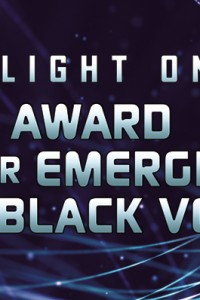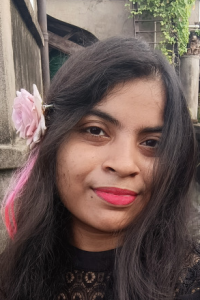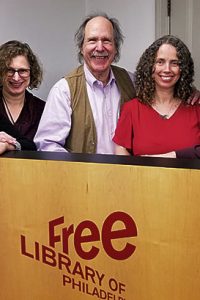Isabel Yap: Full Circle

Victoria Isabel Santiago Yap was born May 23, 1990 in Manila in the Philippines and grew up in Quezon City. She attended Ateneo de Manila University for her first two years of undergrad, then moved to the US, where she earned a BS in Marketing from Santa Clara University in 2013. That summer she attended the Clarion Writers Workshop, and since 2016 she has served as secretary for the Clarion Foundation. She worked in the tech industry in the Bay Area and in London before completing an MBA at Harvard Business School, and is currently a product manager at an early-stage startup.
Yap is a prolific fanfiction writer, producing more than 100 works in 30 fandoms. She published original fiction and poetry in the Philippines, including in volumes of the Philippine Speculative Fiction anthology series. Her first professional genre sale was “Have You Heard the One About Anamaria Marquez?” in Nightmare (2014), followed shortly by “A Cup of Salt Tears” in Tor.com (2014). She has since published more than 15 stories, including several in the Hurricane Heels sequence. Some of her short fiction has been collected in Never Have I Ever (2021) from Small Beer Press. She is working on her first novel.
Excerpts from the interview:
“I was pretty lucky early in my career. I started publishing in the Philippines. There’s something called the Palanca Awards that everyone who writes there wants to win, or at least that’s how I felt as a high schooler. They have categories in poetry, essay, novel, and fiction. If you want to get recognized in the Philippine literary scene, you submit to the Palanca Awards, which happen once a year, and hope that you place first, second, or third. That was one of my goals. The other way in is to get published in either a literary folio or an anthology. Those are the outlets. You can get published in a school folio, usually where you’re attending college, or you could try to submit to one of the national magazines. There were really only two that took fiction, Graphic Magazine and The Philippines Free Press. There was this website where people would post about anthologies with open submissions, but there weren’t very many of those. One that I found as a college freshman was for the Philippine Speculative Fiction series. I decided to send in a story there, and got an acceptance on my first try. That was obviously very exciting – up until that point I’d only been published in school folios, which was also pretty exciting, but it’s different when it’s a book that’s going to be published outside your university. The next year they had another call for volume five, I submitted a story, and I got accepted there as well. For the publications I had in the Philippines, it was usually like that. There’d be an anthology, and the editors would either solicit me or there’d be an open call, and I would write on demand. ‘Oh, there’s a horror young-adult anthology. Okay, I will write a horror young-adult story.’ Most of them were unthemed, but speculative. I would submit to those and get accepted. I had a pretty good hit rate for the Filipino folios in spec fic. I was also trying to write literary fiction. There was an anthology for stories about infidelity or something, which I wrote a story for, and they didn’t accept it. For whatever reason, the places that liked my stories were the spec fic outlets. I only submitted to Philippine anthologies – it didn’t ever occur to me to submit my stories to international publications. Like, who does that? Everyone around me, all the other writers, were also just submitting to the same places. I can’t stress how little I thought about submitting to US magazines – I didn’t even know what they were. I didn’t have any knowledge of publishing outside of the Philippines.
“I moved to America in 2010, my junior year of college. At that point, I’d been starting to get a little bit established in the Philippines, and I’d gotten into a prestigious national workshop. I was really more focused on poetry at that time, and starting to establish myself as a poet. The fiction was nice because I would get into these anthologies, but my community was really more poets. I tried to get into the most prestigious national workshop, the Silliman National Writers Workshop in Dumaguete, and I wasn’t accepted. I was just crushed. In my poetry community, when my friends found out I didn’t get in, they would say, ‘Oh no, I was so sure you would get in.’ It wasn’t their intention, but that made me feel very ashamed. I actually got blisters on my hands and feet from the shame. It was weird – like my body was rejecting the idea. I was just very dramatic at that time, and I assumed if I didn’t get into Dumaguete then I was leaving my community. I was so sure that whatever writing career I had was over. I was moving to the States, and I was a business major – I just didn’t see a way forward.
“So I moved to America. I took a break from writing. I was still doing anthology stuff, so if one of my previous editors said, ‘Isa, we have this book,’ I would say, ‘Okay, I’ll do that for you.’ But I felt detached from everything. I didn’t have a community – I’d lost my community. I was still a business major, though I was also an English minor, so I would be forced to take creative writing classes at my university, which meant I was generating some work. But still, I was in a fog, and moving was really difficult for me. There were a lot of deaths in my family in a short amount of time, and so those were weighing on me. I had this dramatic thing – ‘I’m going to finish my business degree and then that’s it for writing. I will keep writing fanfiction. I love it, so I will keep writing for myself, but I don’t know what else I can do publishing-wise. I guess I’ll keep doing the anthologies in the Philippines, but that’s about it.’
“Then I attended the Clarion workshop. There were two things that led to that happening. One of the people whose fanfics I liked the most recommended Kelly Link’s book Pretty Monsters. I found a copy, and I was really blown away. I was like, ‘Oh, short fiction can do that’ – I was deeply impressed. What a great author! Then my one writing friend in undergrad in California, a poet, had attended some poetry workshops, and said, ‘Isabel, you should apply to some of these poetry workshops.’ Obviously, I had this gigantic chip on my shoulder because I had failed to get into that one workshop. I was like, ‘No workshops. If I couldn’t get into one in the Philippines, how can I get into one in the States?’ But because she told me to try, I googled California writing workshops, and the first one that came up was Clarion. I’d never heard of it and, again, my focus at that time was poetry. But when I clicked on the Clarion workshop, I saw the instructor lineup for 2013 included Kelly Link. Kelly Link is going to teach at this thing? I’ve got to apply. The workshop was six weeks in the summer, and that was going to be the summer after I graduated college. That worked out, because I could do the Clarion thing before I started working full time. I knew when I started working, I would be too focused on my tech career. It was precarious for me job-hunting because I was an international student, and it’s hard for us to get jobs so we can stay in the States. I applied to Clarion without knowing much about it. I hadn’t written a new story in a while, but I wrote two for the application, in the same way that I’d written stories on demand for anthologies. I was accepted, and I was just so surprised and happy and feeling very fortunate that whole time. I didn’t know the history of the workshop, or who had gone to it before. Going to Clarion really changed the trajectory of my career, first of all because I wrote seven stories – two for my application, and while I was there I wrote five more. That got me back into the right mindset – ‘You can actually write a story if you stop being so dramatic.’
“I didn’t have expectations when I went to Clarion. To be honest, and this shows a colonial mentality, I thought my stories were ‘good enough’ for a Filipino audience, but I had no idea how they would perform on an international stage. I could not tell if they would resonate with people not from the Philippines. Now I realize that’s a crappy way to think, and my most precious audience is Filipinos. But at that time I wondered if anyone would get my work if they weren’t from the Philippines. My instructors for the most part were pretty responsive and said, ‘You have something.’ In my one-on-one conferences, I would usually ask them, ‘What do I do well, what can I do better, and what do you think? Is there anything here?’ That’s really what I was trying to get out of the experience – is there something here, or should I just stop trying? Not that any teacher is going to tell you to stop, but that’s what I was looking for – a sign that I could do something with this. Many of them said quite clearly, ‘If you keep writing, something will happen. I’m not going to say when, because it’s hard to get published, but you’ve got something.’ It wasn’t like everyone was praising me, but I took that feedback quite seriously. I can’t assess my own work, but if Nalo Hopkinson or Karen Joy Fowler says, ‘You’ve got something,’ then I’ll take that. I don’t trust myself, but I trust them. There were some stories where they told me, ‘You can send this out already.’ That’s what I did. Clarion is where I learned about the different publications. I did my research. I read at least one or two issues from every magazine after Clarion, to see which fit my taste. I followed everyone’s advice and did what they suggested. Kelly said to try Ellen Datlow, and she rejected my story, but she said to try F&SF or John Joseph Adams. I submitted the story to JJA and he took it for Nightmare. That started everything. I sent a story to Tor.com‘s slush pile and waited seven months and got accepted – that’s fast for them. I was prepared to wait a year. That’s how much I wanted to get in. I know it’s much more common to get a rejection at the end of the seven months. Carl Engle-Laird was a newer editor at that time, and he took my story. I am proud of those stories, and I was also very lucky the editors saw something in them. I got lucky right out of the gate.”
Interview design by Francesca Myman. Photo by Shuyao Kong.
Read the full interview in the April 2021 issue of Locus.
 While you are here, please take a moment to support Locus with a one-time or recurring donation. We rely on reader donations to keep the magazine and site going, and would like to keep the site paywall free, but WE NEED YOUR FINANCIAL SUPPORT to continue quality coverage of the science fiction and fantasy field.
While you are here, please take a moment to support Locus with a one-time or recurring donation. We rely on reader donations to keep the magazine and site going, and would like to keep the site paywall free, but WE NEED YOUR FINANCIAL SUPPORT to continue quality coverage of the science fiction and fantasy field.
©Locus Magazine. Copyrighted material may not be republished without permission of LSFF.







